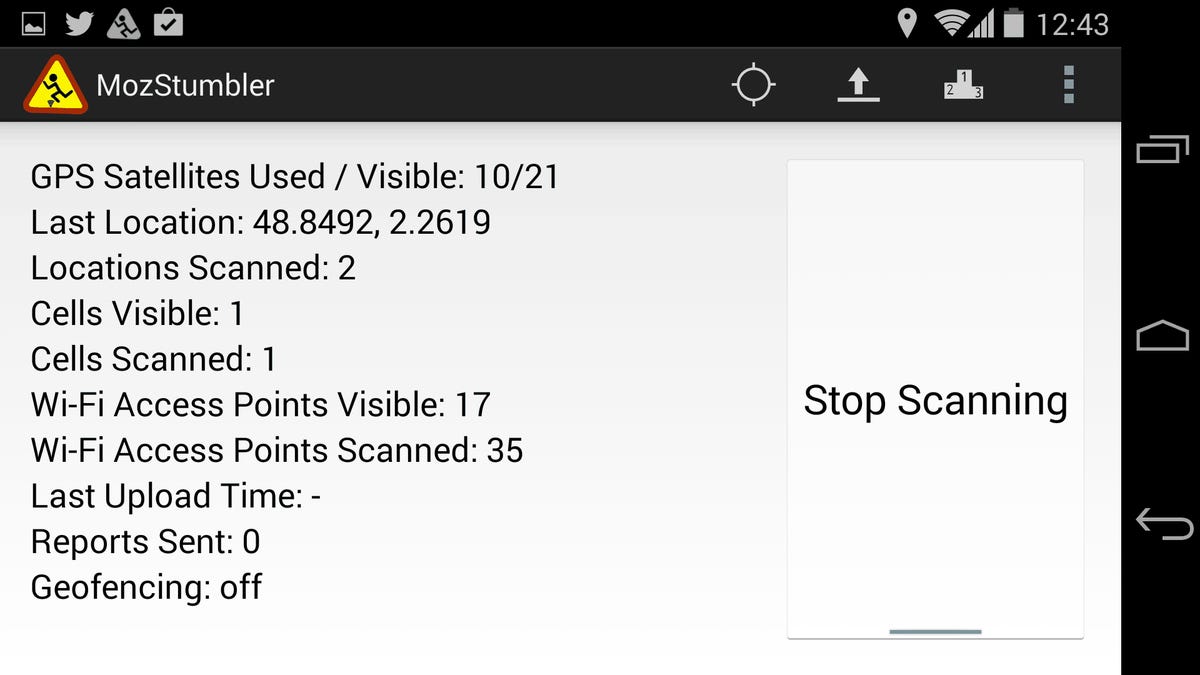
Screenshot by Stephen Shankland/CNET
Mozilla has an immensely challenging goal: making it easier for people to avoid getting stuck in the technology domains of tech giants such as Google, Apple, Facebook, Microsoft, and Amazon. If you’re sympathetic, the Firefox developer has an app for that. Or at least for one small but important part of it, figuring out where your phone is, based on what Wi-Fi networks and mobile phone base stations are nearby.
The MozStumbler project is an Android app that sniffs the ether for radio signals, couples it with your location as measured by GPS, and sends the data to Mozilla. It’s a critical component of Mozilla Location Service, a publicly available interface that tells a computer or mobile device its location based on that wireless network data.
It may sound like a small thing, but it’s the kind of thing that’s important to the success of Firefox OS, the smartphone operating system with which Mozilla hopes bring the openness of the Web to mobile ecosystems. Location services are fundamental to modern smartphones, and right now Mozilla relies on Qualcomm’s proprietary service for Firefox OS and on Google for Firefox on PCs.
Mozilla has successfully tapped into its enthusiastic user base before, most notably when it embraced open-source software and open standards to counter the dominance of Microsoft’s Internet Explorer. Now it’s trying to marshal its fan base to take on a new bête noire: the closed ecosystem. These collections of hardware, software, services, and content make it hard for people to do things like move from iOS to Android without losing all their rights to downloaded movies and apps they’ve paid for.


Screenshot by Stephen Shankland/CNET
For someone like Mozilla to lower those barriers, “You have to have services,” newly named Mozilla CEO Brendan Eich told CNET this week.
It’s not clear how broad Mozilla’s services ambition is, but the non-profit organization is also working on an open payment system integrated with the Firefox Marketplace. And it’s working hard on identity issues, too, since Firefox and Firefox OS users need an account to synchronize browsing history, passwords, and other data.
Mozilla Location Services and MozStumbler are very Mozilla-flavored projects: open-source software that relies on the collective efforts of many individuals and that produces a freely usable result.
MozStumbler isn’t an easy download from the App Store, though. You have to sideload the MozStumbler Android .apk installation file, which doesn’t take a computer science degree but will deter many casual users.
Mozilla said it’s not ready yet for wider release.
“MozStumbler is part of a research project to investigate crowdsourced mapping of wireless networks,” said spokesman Justin O’Kelly. “At this stage we are still evaluating its functionality before deciding whether to move it into a more mature distribution channel.”
Those who do run it will see a bare-bones but workable interface for tracking location and wireless signals and then uploading data to Mozilla. People who don’t want to reveal information about their home location can use the settings to switch on “geofencing,” which blocks the upload of data from a 1km radius of a designated spot.
To get people motivated, Mozilla also hosts a MozStumbler leaderboard. That brings an element of competition to the data-gathering effort, but be warned: some active users already have a big head start.



